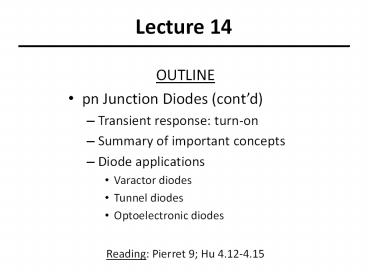OUTLINE - PowerPoint PPT Presentation
1 / 15
Title:
OUTLINE
Description:
Lecture 14 OUTLINE pn Junction Diodes (cont d) Transient response: turn-on Summary of important concepts Diode applications Varactor diodes Tunnel diodes – PowerPoint PPT presentation
Number of Views:108
Avg rating:3.0/5.0
Title: OUTLINE
1
Lecture 14
- OUTLINE
- pn Junction Diodes (contd)
- Transient response turn-on
- Summary of important concepts
- Diode applications
- Varactor diodes
- Tunnel diodes
- Optoelectronic diodes
- Reading Pierret 9 Hu 4.12-4.15
2
Turn-On Transient
- Consider a pn diode (Qp gtgt Qn)
i(t)
Dpn(x)
t
vA(t)
x
xn
t
For t gt 0
Lecture 14, Slide 2
EE130/230A Fall 2013
3
- By separation of variables and integration, we
have - If we assume that the build-up of stored charge
occurs quasi-statically so that - then
Lecture 14, Slide 3
EE130/230A Fall 2013
4
- If tp is large, then the time required to turn on
the diode is approximately DQ/IF
Lecture 14, Slide 4
EE130/230A Fall 2013
5
Summary of Important Concepts
- Under forward bias, minority carriers are
injected into the quasi-neutral regions of the
diode. - The current flowing across the junction is
comprised of hole and electron components. - If the junction is asymmetrically doped (i.e. it
is one-sided) then one of these components will
be dominant. - In a long-base diode, the injected minority
carriers recombine with majority carriers within
the quasi-neutral regions.
Lecture 14, Slide 5
EE130/230A Fall 2013
6
- The ideal diode equation stipulates the
relationship between JN(-xp) and JP(xn) - For example, if holes are forced to flow across a
forward-biased junction, then electrons must also
be injected across the junction.
Lecture 14, Slide 6
EE130/230A Fall 2013
7
- Under reverse bias, minority carriers are
collected into the quasi-neutral regions of the
diode. - Minority carriers generated within a diffusion
length of the depletion region diffuse into the
depletion region and then are swept across the
junction by the electric field. - The negative current flowing in a reverse-biased
diode depends on the rate at which minority
carriers are supplied from the quasi-neutral
regions. - Electron-hole pair generation within the
depletion region also contributes negative diode
current.
Lecture 14, Slide 7
EE130/230A Fall 2013
8
pn Junction as a Temperature Sensor
C. C. Hu, Modern Semiconductor Devices for ICs,
Figure 4-21
Lecture 14, Slide 8
EE130/230A Fall 2013
9
Varactor Diode
- Voltage-controlled capacitance
- Used in oscillators and detectors
- (e.g. FM demodulation circuits in your radios)
- Response changes by tailoring doping profile
Lecture 14, Slide 9
EE130/230A Fall 2013
10
Optoelectronic Diodes
Lecture 14, Slide 10
EE130/230A Fall 2013
R.F. Pierret, Semiconductor Fundamentals, Figure
9.2
11
Open Circuit Voltage, VOC
Lecture 14, Slide 11
EE130/230A Fall 2013
C. C. Hu, Modern Semiconductor Devices for ICs,
Figure 4-25(b)
12
Solar Cell StructureCyferz at en.wikipedia
Lecture 14, Slide 12
EE130/230A Fall 2013
13
Textured Si surface for reduced reflectance
- Achieved by anisotropic wet etching (e.g. in KOH)
M. A. Green et al., IEEE Trans. Electron Devices,
Vol. 37, pp. 331-336, 1990
P. Papet et al., Solar Energy Materials and Solar
Cells, Vol. 90, p. 2319, 2006
Lecture 14, Slide 13
EE130/230A Fall 2013
14
p-i-n Photodiodes
- W ? Wi-region, so most carriers are generated in
the depletion region - ? faster response time (10 GHz operation)
- Operate near avalanche to amplify signal
R.F. Pierret, Semiconductor Fundamentals, Figure
9.5
Lecture 14, Slide 14
EE130/230A Fall 2013
15
Light Emitting Diodes (LEDs)
- LEDs are made with compound semiconductors
(direct bandgap)
R.F. Pierret, Semiconductor Fundamentals, Figure
9.13
R.F. Pierret, Semiconductor Fundamentals, Figure
9.15
Lecture 14, Slide 15
EE130/230A Fall 2013
























![[READ]⚡PDF✔ Black Letter Outline on Contracts (Black Letter Outlines) 5th Edition PowerPoint PPT Presentation](https://s3.amazonaws.com/images.powershow.com/10044064.th0.jpg?_=20240531080)

![[PDF] DOWNLOAD FREE Clinical Outline of Oral Pathology: Diagnosis and PowerPoint PPT Presentation](https://s3.amazonaws.com/images.powershow.com/10076578.th0.jpg?_=20240711025)




